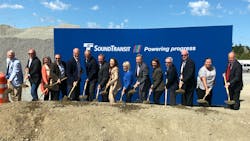Sound Transit and its partners held a groundbreaking ceremony Sept. 3 for the Lynnwood Link Extension, an 8.5-mile, four-station light-rail line that will connect Northgate to Lynnwood City Center.
An estimated one million new residents are expected to be in Puget Sound by 2040 and the Lynnwood Link Extension should provide relief to increasingly bad traffic congestion when it opens in 2024. Sound Transit says riders will enjoy fast, frequent and reliable service between south Snohomish County and the University of Washington, downtown Seattle, the Eastside, Sea-Tac Airport and more.
"Today's groundbreaking is the culmination of more than a decade of planning and preparation," said Sound Transit CEO Peter Rogoff. "From the beginning, this project has received enthusiastic support from the federal, state and local governments, our congressional delegation, the business and labor communities, and voters — a sign of the hunger for relief from the horrendous highway congestion facing travelers every day. This project will be a game changer for Snohomish County commuters. And in the years to come, we will be extending Link from Lynnwood all the way to Everett."
The path to this milestone was not always easy. For example, in 2017, cost estimates increased for the extension due in part to drastic spikes in property values and construction costs. Six months of work between Sound Transit, its contractors, partner agencies and municipalities resulted in the identification of more than 100 cost saving measures that could be implemented without reducing stations or park and ride facilities.
"You cannot have a big-league economy with little league infrastructure," said Rep. Rick Larsen (D-WA-02). "Sound Transit light rail is coming to Snohomish County, and that means more jobs and more opportunity. The Lynnwood Link Extension will help with traffic congestion and provide a reliable commuting option for an additional 47,000 to 55,000 daily riders who are traveling to work, school and home."
The $2.9-billion project will be constructed by Stacy & Witbeck/Kiewit/Hoffman JV and Skanska L300 JV. Funding for the project includes up to $1.17 billion from a Full Funding Grant Agreement executed with the Federal Transit Administration through the New Starts program. Additionally, Sound Transit executed a Master Credit Agreement through the Transportation Infrastructure Finance and Innovation Act (TIFIA) loan program with the U.S Department of Transportation’s Build American Bureau that helped finance four Sound Transit projects and included $659 million for the Lynnwood Link Extension. Sound Transit explains that the agreement should save regional taxpayers between $200 million and $300 million through lower interest costs.
Once service begins, Sound Transit plans for trains to operate every four to six minutes during weekday peak hours and projects ridership to reach between 47,000 and 55,000 daily riders by 2026.
About the Author

Mischa Wanek-Libman
Group Editorial Director
Mischa Wanek-Libman is director of communications with Transdev North America. She has more than 20 years of experience working in the transportation industry covering construction projects, engineering challenges, transit and rail operations and best practices.
Wanek-Libman has held top editorial positions at freight rail and public transportation business-to-business publications including as editor-in-chief and editorial director of Mass Transit from 2018-2024. She has been recognized for editorial excellence through her individual work, as well as for collaborative content.
She is an active member of the American Public Transportation Association's Marketing and Communications Committee and served 14 years as a Board Observer on the National Railroad Construction and Maintenance Association (NRC) Board of Directors.
She is a graduate of Drake University in Des Moines, Iowa, where she earned a Bachelor of Arts degree in Journalism and Mass Communication.
